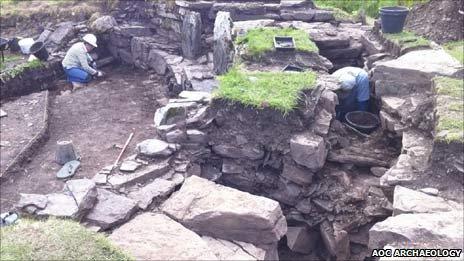Human remains found at Caithness Iron Age broch site
- Published

Archaeologists and volunteers have been digging at the ruins of an ancient roundhouse
Human remains including parts of a skull and leg bones have been found during an archaeological dig at an Iron Age site in Caithness.
The police and procurator fiscal service have been notified of the finds at Thrumster, near Wick, as normal procedure by archaeologists.
The remains have still to be radiocarbon dated to determine how old they are.
Ancient human remains have previously been uncovered in Caithness.
AOC Archaeology and Yarrows Heritage Trust have been leading teams of 12 to 15 volunteers on the dig.
Dr Andy Heald, of AOC Archaeology, said they had established the site held the ruins of a broch, a massive stone wall Iron Age roundhouse.
He said the bones found could be those of a man.
'Even puppies'
Dr Heald said: "At the moment we have no idea on a date. They could be 50 years old, or 3,000 years old."
If analysis finds that the remains were ancient then they could have been placed as part of a ritual honouring the dead.
Dr Heald said: "When skulls were found in the 19th Century people thought it had to do with cannibalism, or were war trophies.
"Cannibalism is just nonsense."
He added: "At another Caithness site at Whitegate human remains, horses and even puppies were placed at a broch 300 years after it was abandoned.
"It was done in some sort of memory ritual, or for it to be a monument on the landscape."
Caithness has more brochs per square mile than any other part of Scotland, according to Highland Council.
Examples of the ancient buildings are also found on Orkney.
- Published2 May 2011